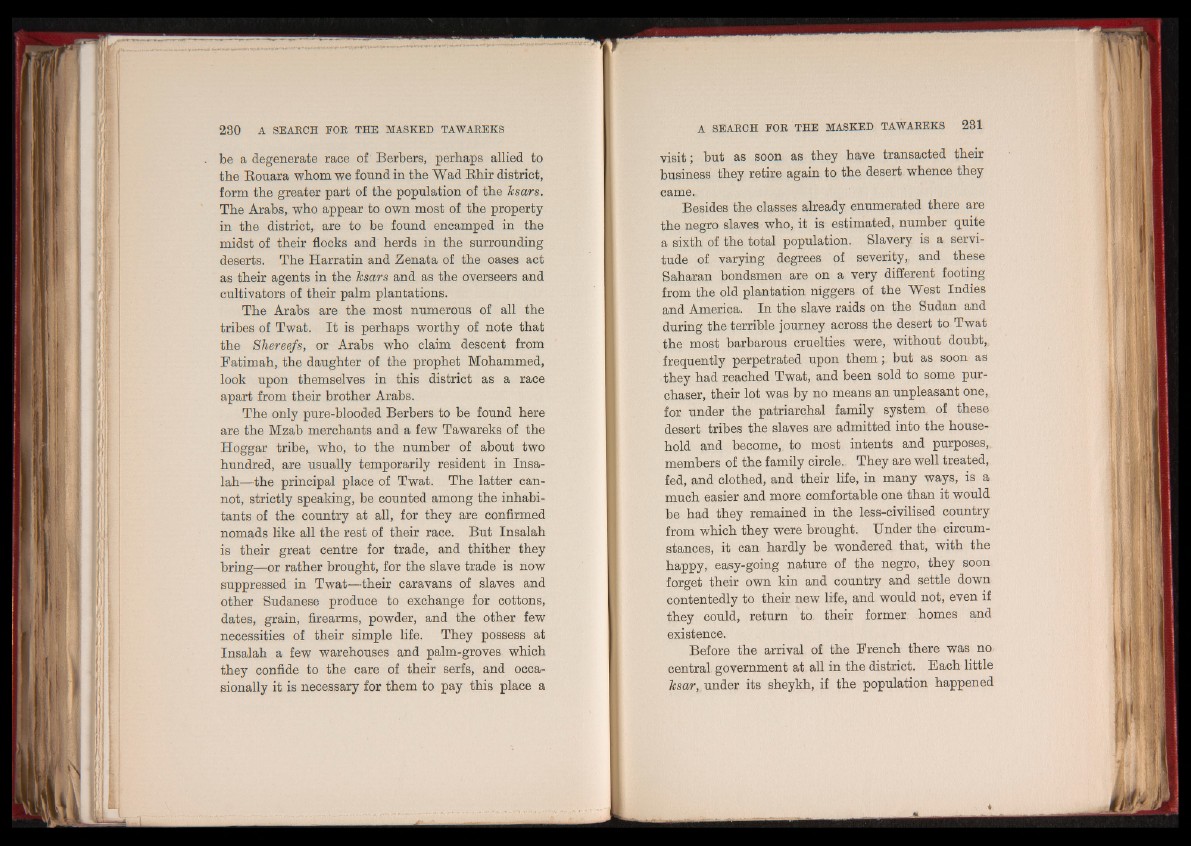
be a degenerate race of Berbers, perhaps allied to
the Rouara whom we found in the Wad Rhir district,
form the greater part of the population of the Tcsars.
The Arabs, who appear to own most of the property
in the district, are to be found encamped in the
midst of their flocks and herds in the surrounding
deserts. The Harratin and Zenata of the oases act
as their agents in the hsars and as the overseers and
cultivators of their palm plantations.
The Arabs are the most numerous of all the
tribes of Twat. It is perhaps worthy of note that
the Shereefs, or Arabs who claim descent from
Fatimah, the daughter of the prophet Mohammed,
look upon themselves in this district as a race
apart from their brother Arabs.
The only pure-blooded Berbers to be found here
are the Mzab merchants and a few Tawareks of the
Hoggar tribe, who, to the number of about two
hundred, are usually temporarily resident in Insa-
lah—the principal place of Twat. The latter cannot,
strictly speaking, be counted among the inhabitants
of the country at all, for they are confirmed
nomads like all the rest of their race. But Insalah
is their great centre for trade, and thither they
bring—or rather brought, for the slave trade is now
suppressed in Twat—their caravans of slaves and
other Sudanese produce to exchange for cottons,
dates, grain, firearms, powder, and the other few
necessities of their simple life. They possess at
Insalah a few warehouses and palm-groves which
they confide to the care of their serfs, and occasionally
it is necessary for them to pay this place a
visit; but as soon as they have transacted their
business they retire again to the desert whence they
came.
Besides the classes already enumerated there are
the negro slaves who, it is estimated, number quite
a sixth of the total population. Slavery is a servitude
of varying degrees of severity,, and these
Saharan bondsmen are on a very different footing
from the old plantation niggers of the West Indies
and America. In the slave raids on the Sudan and
during the terrible journey across the desert to Twat
the most barbarous cruelties were, without doubt,
frequently perpetrated upon them; but as soon as
they had reached Twat, and been sold to some purchaser,
their lot was by no means an unpleasant one,
for under the patriarchal family system of these
desert tribes the slaves are admitted into the household
and become, to most intents and purposes,
members of the family circle. They are well treated,
fed, and clothed, and their life, in many ways, is a
much easier and more comfortable one than it would
be had they remained in the less-civilised country
from which they were brought. Under the circumstances,
it can hardly be wondered that, with the
happy, easy-going nature of the negro, they soon
forget their own kin and country and settle down
contentedly to their new life, and would not, even if
they could, return to their former homes and
existence.
Before the arrival of the French there was no
central government at all in the district. Each little
hsar, under its sheykh, if the population happened